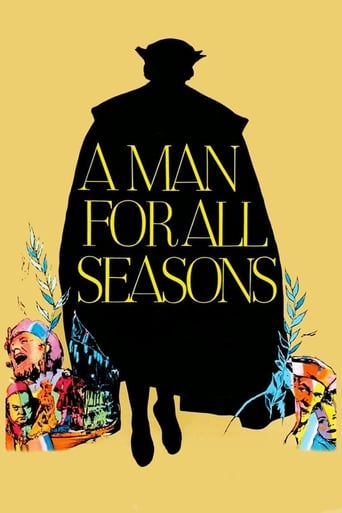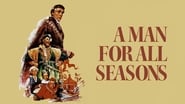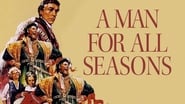jacobs-greenwood
A pretty good film about a man who sticks to his principles when everyone else has abandoned theirs for convenience, power, wealth, and/or the status quo. Does the audience for this film exist today (would anyone "get it"?).The film, its lead actor (Paul Scofield), its director (Fred Zinnemann, From Here to Eternity (1953)), Ted Moore's Color Cinematography (his only nomination), its Color Costume Design, and the Adapted Screenplay Writing by Robert Bolt (Doctor Zhivago (1965)) all won Academy Awards. Supporting players Robert Shaw and Wendy Hiller were Oscar nominated.Scofield plays Sir Thomas More (the title character), who is asked by King Henry VIII (Shaw) to approve his divorce of Catherine so that he might marry Ann Boleyn (Vanessa Redgrave). More refuses his king which ultimately leads to his undoing.Hiller plays More's wife Alice, Susannah York his daughter Margaret. Orson Welles plays Cardinal Wolsey, Leo McKern plays Thomas Cromwell, Nigel Davenport plays the Duke of Norfolk, and John Hurt plays Richard Rich.
Lee Eisenberg
Sir Thomas More was Lord Chancellor of England in the early 1500s. He opposed King Henry VIII's decision to break off from the Catholic Church and divorce his wife. This story gets dramatized in "A Man for All Seasons", showing the moral dilemma that More faced. Paul Scofield plays More as a man who simply did what he thought was right in the face of insurmountable odds.To my knowledge, this was the second time that Fred Zinnemann had directed a movie about a person who is forced to follow his conscience in a desperate situation (the other was "High Noon"). Both are examples of some of the best that cinema has to offer. It's a shame that Zinnemann isn't a more well known director; he also gave us "From Here to Eternity" and "Julia". Even if you don't know much about England's history, this is still a fascinating story. Along with Scofield, we get outstanding performances from Robert Shaw as Henry, Leo McKern (the cult leader in "Help!") as Cromwell, and Susannah York as More's wife Margaret.And yes, I think that John Hurt's character looks like Ringo Starr.
Bryan Kluger
One of the greatest film directors of all time is Fred Zinnemann, and the shocking thing is, most people wouldn't know who that is, let alone even heard the name. He has a whopping 65 Oscar nominations under his belt with a great 24 wins. His films have stood the test of time and continue to be debated and discussed to this day. Perhaps Zinnemann is most known for 'High Noon', 'Oklahoma', 'The Nun's Story', and 1977's 'Julia'. All of those movies are excellent and have each earned their own numerous awards in filmmaking.But there is another film from 1966, which was one of Zinnemann's last films that not only took home Best Picture, Best Screenplay, and Best Actor, but it is the best film ever made according to The Vatican. Needless to say, that's a pretty high honor, considering the film isn't 100% about religion. The film centers around the time where King Henry VIII was wanting to marry Anne Boleyn, and right before the King became the chaotic leader he is known for. But this story does not follow around King Henry (Robert 'Jaws' Shaw), but rather 'A Man for All Season' focuses on Sir Thomas More (Paul Scofield), a family man who was the right hand man to King Henry VIII, at least for a little while.Based on the 1960 stage play by Robert Bolt with Bolt writing the screenplay, 'A Man for All Seasons' can be seen as an accurate portrayal of the downfall of one of the most infamous kings in England, not to mention the intense and brilliant dialogue that occurs. As the film starts out, King Henry is already wanting to marry Boleyn and leave Lady Aragon, because she cannot bear children, specifically a son to take the reigns someday, which is something King Henry is obsessed about. He has his lord chancellor Wolsey (Orson Welles) ask Sir Thomas More, Henry's right hand man to attend a secret meeting to convince the Pope to allow Henry to divorce his wife and marry another.If you're Catholic, you have been told this a big "no-no" in the religion. Already knowing that the Pope will not agree to this, Sir Thomas More, declines to help. You see, back then, almost everything had to be approved before the Pope and the church, and if it wasn't "kosher", it would be considered illegal. When More declines, King Henry tries to bribe More with power and riches. When that doesn't work, King Henry takes a more violent approach. All the while, Sir Thomas More sticks to his religious convictions and does what's right by his family and God. He never bows down or takes the low road. Instead, he takes the righteous path, always standing up to what he believes him, no matter what the obstacle is to overcome.Well, we all know what happened, King Henry overthrew the Pope basically, making it law that the church had no say on people's lives. He went on to marry five more women, some of whom he had killed. But what works so well with 'A Man for All Seasons' is the attention to detail of the time period, and the incredible performances by each actor. These actors just throw themselves into these roles and make you believe every single action and emotion, especially Paul Scofield, who is one of the best Shakespearean actors to have ever lived. He fully immersed himself into these roles and there are stories of how intense he was on set in character. It definitely shows here as he won Best Actor at the Oscars for his role here. 'A Man for All Seasons' is smart, beautiful, and well-acted, and remains one of the best adaptations of King Henry VIII's life out there today.
jvance-566-20403
Try to imagine a time when there was only one "Church", where diocesan/papal power was supreme and separation from the Church body was the one of the most terrifying punishments that could be meted out. And in this same time temporal kings absolutely believed that it was their divine right to rule with impunity over the masses.Combine these conditions with a transcendent confrontation between 2 of the most intricate and influential intellectual giants of the era and you've got the basis for a truly epic tale - and it's not fiction.Add a gifted modern playwright and a superb cinematic director and let them work their magic. The result is one of the finest dramatic expositions ever brought before the public.There are plenty of other commenters with details and technical observations far superior to what I could offer so I won't bother adding to them. I will say that if you figure there could be nothing remotely interesting or inspiring in a conflict between a narcissistic, power-mad potentate and a pious religious scholar you're absolutely wrong and missing out on a real opportunity.





